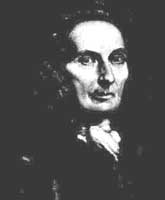
Abraham De Moivre (1667-1754) was born in France, a Hugenot (like our own Paul Revere), differing religiously from the Roman Catholic majority. In 1685, King Louis XIV revoked The Edict of Nantes, which had granted civil rights to Protestants. 400,000 Huguenots emigrated to England, to The American Colonies, and elsewhere. Young De Moivre was briefly imprisoned, then allowed to escape to England, where he lived the rest of his life.In 1718, De Moivre published a momentous treatise on probability theory: The Book of Chances. (This included the first appearance of the "bell" curve sometimes attributed to Gauss, but should be credited to De Moivre.) This book contained a paper showing that an effective formula for an annuity (collecting for a "pension") could be approximated by a simple linear equation. This was improved later, and the annuity became a "stock-in-trade" of the burgeoning insurance industry.
Moivre, himself, enjoyed no such a benefit. Efforts of Sir Isaac Newton and astronomer William Halley to find a teaching job for this French mathematician were of no avail. So, until age 80, De Moivre supported himself by sitting in a London tavern, tutoring in mathematics, calculating odds for gamblers, and compiling tables for insurance companies.
This, or any other annuity formula, is ARITHMETIC BACKWARDS.
- KNOWN: Desired accumulation.
- KNOWN: Years of investment before "reaping".
- KNOWN: average interest on investment.
- UNKNOWN: Amount to invest each period to achieve desired accumulation.
Amortization is annuity translated from individual math (or insurance math into business math). Instead of borrowing money from the bank for new equipment or some other NEED, a manager can "lay away" money for this purpose. Again, ARITHMETIC BACKWARDS: ALGEBRA).
This has contributed to our present "Fiduciary Society", in which much of the total wealth of the country is in pension funds of unions and companies.